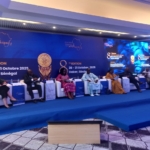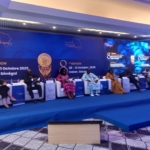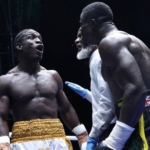
The third day of the 2025 Galien Africa Forum focused largely on women’s leadership and equality as key drivers of health sovereignty across the continent. A number of plenary sessions were held concurrently under varied sub-themes to address the issue of Africans taking control of Africa’s health needs.
Leading the discussions at the Women’s Forum, on the role of the media and its impact on the continent on health promotion, President of the African Media Network for the Promotion of Health and the Environment (REMAPSEN), Mr. Youssouf Bamba, made a strong case for the media’s role in advancing Africa’s health sovereignty.
With representation in over forty African countries, REMAPSEN has established itself as a leading continental platform for health and environmental journalism. Through strategic partnerships with government institutions, international organisations, and civil society, REMAPSEN engages in public awareness creation, advocating policy dialogues on health governance, environmental sustainability and climate resilience across West and Central Africa.
As a leader of the first-ever thriving Africa Media network, Mr Bamaba argued as development centres organisation who are working to bridge the information gap particularly between state actors and the populace, “health sovereignty cannot be won without accurate communication,” he stressed.
He warned that “if you leave everything concerning your messaging and communication to anyone else, you risk miscommunicating the data you produce as an entity in developments. Media must be seen as a development partner in health sovereignty in Africa, as vectors of accurate information because information is key.”
Bamba’s remarks were one of several from the other speakers which set the tone for a session that explored how women’s empowerment, equity, and communication intersect to shape better health outcomes for Africa.
Moderated by Professor Ndioro Ndiaye, President of the Alliance for Migration, Leadership and Development, and Mr. James Wanki of UNFPA, the forum examined the sub-theme: “Correcting Inequalities for Health Sovereignty in Africa.”
Prof. Ndiaye opened the session with a sobering reminder: “achieving Africa’s health sovereignty will depend not only on medical innovation but also on equity, mentorship, and the strategic use of media to drive accurate, inclusive, and transformative communication”. She observed that key actors in all of these sectors particularly for those attending the 2025 Galien Forum must be seen as taking the bull by the horn to make this objective a reality and not just as any other talk-shop.
Her co-moderator, Jame Wanki, reminded the gathering to be minded by the facts that “every four minutes, a pregnant woman dies; every seventeen seconds, a newborn is lost in the region”. He called for political will and social change to address gender inequities, adding that “gender equality is political” and urging for a reset of social norms to promote positive masculinity.
From Nigeria, Dr. Amina Aminu Dorayi, Senior Country Director of Pathfinder International, underscored that equity must be at the heart of health systems strengthening.
In Benin, Prof. Christine Ouinsavi, Chair of the Steering Committee of the Ouagadougou Partnership Women Leadership Accelerator (OWLA), re-echoed mentorship as a critical tool for sustaining progress in women’s health. According to her, “in the last two decades, health indicators have improved, but to sustain the gains, we must involve the youth,” she said. “Mentorship unlocks potential and ensures results. Networking among women and across generations is essential for development.”
Representing UNICEF, Mrs. Ulrike Gilbert brought to the fore the importance of disaggregated data in advancing community health at all levels. She noted that while progress has been made in maternal care investments, more financial support is needed to strengthen women’s participation in the health workforce.
Contributing on behalf of civil society, the Executive Director of a social marketing firm in Senegal, ADEMAS, Dr. Cheikh Saad Bou Sarr, raised concerns about affordability, insisting that “access to health services is very expensive. The cost of quality health products must be cheaper for women” if the continent wants to achieve health sovereignty.
Wrapping up the panel, Dr. Namrata Singh of the Empower School of Health called for economic and social empowerment of women as a pathway to equality, reminding the audience that “empowerment goes beyond access, it is about agency”.
The 8th Galien Africa Forum, which closes on Friday, 31st October 2025, in Dakar, will be crowned with the prestigious 5th Galien Prize Awards at the King Fahd Hotel. The ceremony, to be graced by the President of the Republic of Senegal, will celebrate outstanding innovators, researchers, scientists, and young professionals whose work has significantly advanced healthcare and scientific development across the African continent.
- President Commissions 36.5 Million Dollars Hospital In The Tain District
- You Will Not Go Free For Killing An Hard Working MP – Akufo-Addo To MP’s Killer
- I Will Lead You To Victory – Ato Forson Assures NDC Supporters
Visit Our Social Media for More




